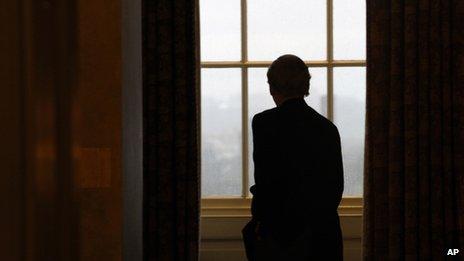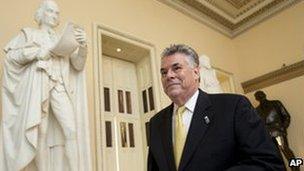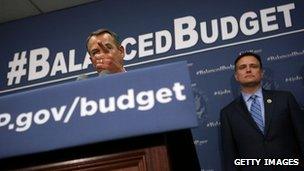Capitol Hill: 'Looking for an exit'
- Published

Senate Minority Leader Mitch McConnell - like everyone else on Capitol Hill, looking for an exit from the shutdown
In gold letters above the Senate chamber it says, "In God we trust".
Perhaps. But there's precious little of that commodity between the two political parties.
In the next 10 days there has to be some, however, or the US goes over the economic brink.
It is now a week since the government shutdown began and there is still no obvious resolution in sight. Both sides are trying to shift the blame on to the other.
The Senate's session opens with a scolding disguised as a prayer.
The chaplin, clearly impatient with the impasse, calls on the Lord to "forgive us for being so otherworldly that we do no earthly good, forgive us that we put politics ahead of progress".
'Sleepy feeling'
On the floor - as rain lashes the Senate dome overhead - there's a sleepy feeling to proceedings. A sense of urgency has obviously been furloughed.
The Democratic Senate leader Harry Reid is almost inaudible and makes his point without a scintilla of passion, accusing the Republican leader of the House, John Boehner, of giving in to "irresponsible Tea Party action".
Only five other senators are there to hear him. The Republican leader in the Senate, Mitch McConnell, is one of them.
He listens slumped at his desk, checking his phone as it bleeps and rings.
When it is his turn to speak he says "negotiation is not a luxury, but a necessity" and "there is a time for politics and a time for sitting down like adults and sorting things out".
When he finishes, he leaves the chamber immediately. Five senators remain.
After all, the Senate floor is not really where this will be brought to an end.
Deals will be done slowly. There will be quiet conversations in offices, testing the limits of what is acceptable. This is what is going on right now.
The President has been very hard-line, saying he won't negotiate. The feeling is he's had enough, has given away too much in the past and does not intend to be jerked around anymore.
But at some stage, he has to shift a little.
Strategy 'a fraud'

Republican congressman Peter King calls the Tea Party's strategy "the craziest idea we've ever had"
One Republican centrist, congressman Peter King, says the Tea Party strategy linking the government shutdown to Obamacare was always a fraud.
"It was the craziest idea we ever had. It never made any sense from the start."
But he says "the president should try to come in. He has to bang heads and make some concessions - not on Obamacare; he's entitled to that, he passed that - but a budget our size. There are areas that can be negotiated".
In the corridors of the Cannon House Office Building, I bump into a group of people representing a low-cost housing group who have come here to lobby moderate Republicans.
One of them, Roxann Larson from Texas, says the whole of the US has been sabotaged and the people of America have to speak up .
The group hope some Republicans will break away from their party and vote with Democrats to re-open the government.
But House Speaker John Boehner is not going allow a vote that would split his party. It is more likely that he will search for a fig leaf to cover up an embarrassing absence of strategy.
'A partial victory'

Congressman Luke Messer stood behind House Speaker John Boehner in April 2013
One Republican congressman, Luke Messer from Indiana, tells me a deal can be done. The argument about the shutdown and the debt ceiling will be rolled together.
I ask him if he could vote for something that did not have anything to do with Obamacare.
"I think there are things that could improve Obamacare that would stop short of defunding it and I could certainly vote for that sort of proposal," Mr Messer said.
"I think the answer here is to bring improvements to Obamacare and keep the government open and lift the debt ceiling."
But is he frightened by the mood back home, I ask, thinking about the Tea Party pressure.
Mr Messer hesitates before saying "it is not about being scared, but in a representative constitutional democracy you [are] accountable to what your voters believe".
"And where I'm from, Obamacare is very unpopular," he said.
My sense is the Republican hard line is softening a little, but they need something that they can at least proclaim as a partial victory. It is not clear if the President will allow them that.
At the moment there is a slight air of panic, everybody looking for an exit, still finding that all the doors are locked.